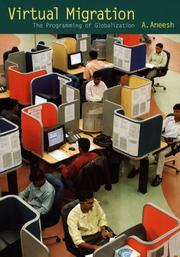| Listing 1 - 6 of 6 |
Sort by
|

ISBN: 0822336693 0822336812 9780822336815 9780822336693 Year: 2006 Publisher: Durham : Duke University Press,
Abstract | Keywords | Export | Availability | Bookmark
 Loading...
Loading...Choose an application
- Reference Manager
- EndNote
- RefWorks (Direct export to RefWorks)
Labor mobility. --- Labor supply --- Contracting out. --- Globalization --- Information technology --- International economic integration. --- Main-d'oeuvre --- Marché du travail --- Impartition --- Mondialisation --- Technologie de l'information --- Intégration économique internationale --- Effect of technological innovations on. --- Economic aspects. --- Mobilité --- Effets des innovations sur --- Aspect économique --- Labor mobility --- Contracting out --- International economic integration --- Effect of technological innovations on --- Economic aspects --- Marché du travail --- Intégration économique internationale --- Mobilité --- Aspect économique --- Labor supply - Effect of technological innovations on --- Globalization - Economic aspects --- Information technology - Economic aspects
Book
ISBN: 9780253009036 9780253009104 Year: 2013 Publisher: Bloomington Indiana university press
Abstract | Keywords | Export | Availability | Bookmark
 Loading...
Loading...Choose an application
- Reference Manager
- EndNote
- RefWorks (Direct export to RefWorks)
Book

ISBN: 0813584299 0813584280 9780813584287 9780813584294 0813584272 9780813584270 9780813584263 0813584264 Year: 2016 Publisher: New Brunswick, NJ
Abstract | Keywords | Export | Availability | Bookmark
 Loading...
Loading...Choose an application
- Reference Manager
- EndNote
- RefWorks (Direct export to RefWorks)
From Thomas Piketty to David Harvey, scholars are increasingly questioning whether we are entering into a post-capitalist era. If so, does this new epoch signal the failure of capitalism and emergence of alternative systems? Or does it mark the ultimate triumph of capitalism as it evolves into an unstoppable entity that takes new forms as it engulfs its opposition? After Capitalism brings together leading scholars from across the academy to offer competing perspectives on capitalism's past incarnations, present conditions, and possible futures. Some contributors reassess classic theorizations of capitalism in light of recent trends, including real estate bubbles, debt relief protests, and the rise of a global creditocracy. Others examine Marx's writings, unemployment, hoarding, "capitalist realism," and coyote (trickster) capitalism, among many other topics. Media and design trends locate the key ideologies of the current economic moment, with authors considering everything from the austerity aesthetics of reality TV to the seductive smoothness of liquid crystal. Even as it draws momentous conclusions about global economic phenomena, After Capitalism also pays close attention to locales as varied as Cuba, India, and Latvia, examining the very different ways that economic conditions have affected the relationship between the state and its citizens. Collectively, these essays raise provocative questions about how we should imagine capitalism in the twenty-first century. Will capitalism, like all economic systems, come to an end, or does there exist in history or elsewhere a hidden world that is already post-capitalist, offering alternative possibilities for thought and action?
Capitalism. --- Democracy. --- Citizenship. --- Birthright citizenship --- Citizenship --- Citizenship (International law) --- National citizenship --- Nationality (Citizenship) --- Self-government --- Market economy --- Law and legislation --- Political science --- Public law --- Allegiance --- Civics --- Domicile --- Political rights --- Equality --- Representative government and representation --- Republics --- Economics --- Profit --- Capital --- Capitalism --- Democracy --- E-books
Digital

ISBN: 9780813584294 9780813584270 Year: 2016 Publisher: New Brunswick, N.J. Rutgers University Press
Abstract | Keywords | Export | Availability | Bookmark
 Loading...
Loading...Choose an application
- Reference Manager
- EndNote
- RefWorks (Direct export to RefWorks)
Book

ISBN: 128049347X 9786613588708 0813551943 9780813551944 9780813551531 0813551536 9780813551548 0813551544 6613588709 Year: 2011 Publisher: New Brunswick, NJ
Abstract | Keywords | Export | Availability | Bookmark
 Loading...
Loading...Choose an application
- Reference Manager
- EndNote
- RefWorks (Direct export to RefWorks)
Does living in a globally networked society mean that we are moving toward a single, homogenous world culture? Or, are we headed for clashes between center and periphery, imperial and subaltern, Western and non-Western, First and Third World? The interdisciplinary essays in Beyond Globalization present us with another possibility—that new media will lead to new kinds of “worldmaking.” This provocative volume brings together the best new work of scholars within such diverse fields as history, sociology, anthropology, film, media studies, and art. Whether examining the inauguration of a virtual community on the website Second Life or investigating the appropriation of biotechnology for transgenic art, this collection highlights how mediated practices have become integral to global culture; how social practices have emerged out of computer-related industries; how contemporary apocalyptic narratives reflect the anxieties of a U.S. culture facing global challenges; and how design, play, and technology help us understand the histories and ideals behind the digital architectures that mediate our everyday actions.
Identity (Psychology) and mass media. --- Globalization --- Mass media and art. --- Mass media --- Mass media and globalization. --- Mass media and culture. --- Culture and mass media --- Culture --- Mass media and identity --- Art and mass media --- Art --- Communication in politics --- Globalization and mass media --- Social aspects. --- Political aspects. --- Mass media Political aspects --- Political aspects
Digital

ISBN: 9780813551944 9780813551531 Year: 2011 Publisher: New Brunswick, N.J. Rutgers University Press
Abstract | Keywords | Export | Availability | Bookmark
 Loading...
Loading...Choose an application
- Reference Manager
- EndNote
- RefWorks (Direct export to RefWorks)
| Listing 1 - 6 of 6 |
Sort by
|

 Search
Search Feedback
Feedback About UniCat
About UniCat  Help
Help News
News